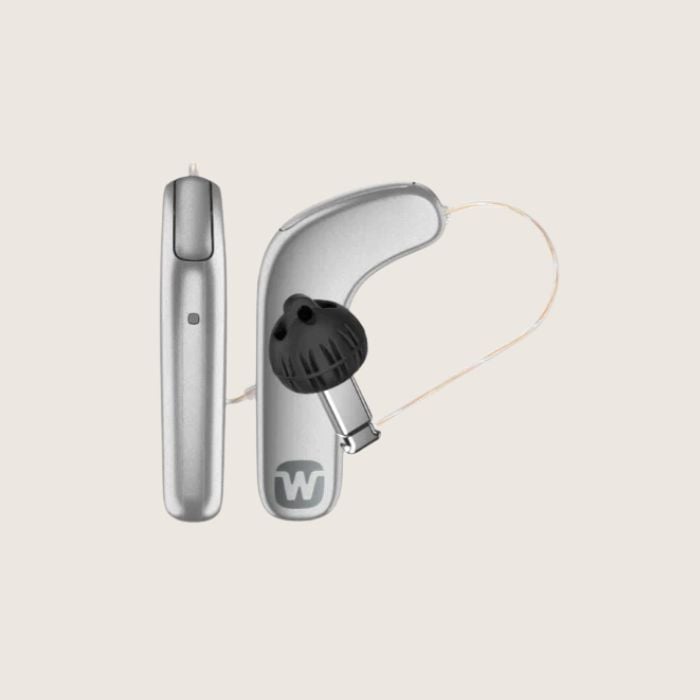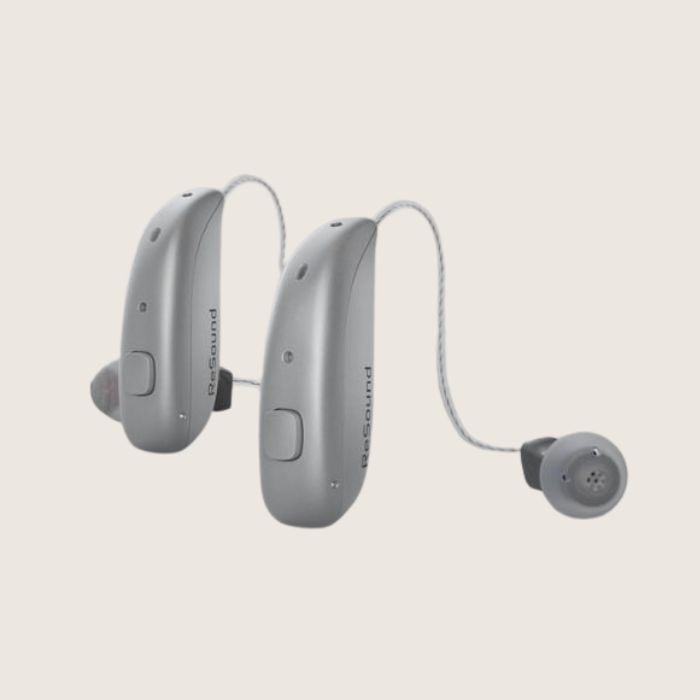Music makes life more enjoyable. Whether it’s a live concert, in the car, or as background noise, music is a way to lift your mood, relax, meditate, and practice self-care.
As an audiologist, I have met many patients who are either musicians or enjoy music and experience hearing loss. Patients commonly express their love for music and its essential role—they want to continue enjoying music, but hearing loss poses a challenge.
This is where hearing aids come in. After all, these devices can significantly affect the quality of life of people with hearing loss. Keep scrolling and I’ll provide tips to optimize your music experience and review the best hearing aids for musicians.
In this article, get the intel on the music listening experience, plus a close look at hearing aids and their ability to process sound and music.
What We Considered in Selecting the Best Hearing Aids for Music
- Wide Dynamic Range: Allows for more realistic sound output.
- Processing Speed: Ensures a lifelike recreation of live music.
- Fitting and Style: Impacts overall music experience.
- Built-In Programming Capabilities: Enables customization with music programs.
- 50+ hearing aid brands reviewed and rated by our team of hearing aid wearers and audiologists
- 200+ hours each month spent researching brands and care options
- 2,000,000 people shopped on Soundly in 2024
- 100% independently owned and operated
Read more about our company, services and process here.
Featured in this article
1. Widex Smart RIC
Widex is a top hearing aid choice among musicians. The Widex Moment Sheer achieves its natural sound quality through its Zero Delay and Pure Sound technology. In addition, it is pared down, which speeds up the processing of the hearing aid to deliver a less distorted and smoother, more authentic sound quality.
Read More About Widex Smart RIC
Widex SmartRIC
- Full-featured prescription hearing
- Unique L-shaped design
- Strong tinnitus management features
- Lowest-delay sound processing
The Widex SmartRIC is the latest flagship receiver-in-canal device from the brand, released in early 2024. It stands out in several key ways.
- First, the SmartRIC boasts the lowest sound delay on the market—by a significant margin. For years, Widex has prioritized rapid sound delivery from the environment to your ears, creating a natural sound quality that many users praise. Its L-shaped design enhances background noise handling without relying on heavy algorithms that could slow down performance.
- Additionally, the Widex SmartRIC is highly recommended for those prioritizing tinnitus treatment. Its onboard tinnitus programs are well-reviewed and offer audiologists a variety of options for fine-tuning and adjustments.
Overall, the Widex SmartRIC is well-respected among audiologists and hearing experts. To purchase this device, you'll need to consult with a local clinic.
- Focused on sound quality, delivering clear sound with the lowest delay in the industry.
- Includes industry leading tinnitus features.
- Widex SmartRIC hearing aids come with rechargeable batteries and Bluetooth streaming capabilities.
- Only sold through local clinics. Remote adjustments require an additional accessory.
- Widex offers a premium product at a premium price that may be out of budget for some.
- Less advanced smartphone app
- Widex SmartRIC is a fully customizable, prescription hearing aid appropriate for mild-severe hearing loss
- If you have severe hearing loss, your care provider may fit you with a custom earmold to reduce feedback
- If you have profound hearing loss, you may be a better fit for a high-powered BTE style (currently available in Widex's previous generation, Widex Moment)
- Widex SmartRIC is a prescription device fit and programmed by a professional
- Widex RemoteLink neck loop is required for remote follow-up programming (requires registering in the hearing clinic's software)
- Widex has the fastest processing time among all major hearing aid manufacturers
- Widex is a favorite choice of musicians and audiophiles
- The SmartRIC features microphones at a 20-degree, near horizontal placement on its unique L-shape. This placement is especially helpful in background noise for better directional focus.
- Widex SmartRIC comes in in a comfortable receiver-in-canal style that is easy to wear all day
- Sits behind the ear with a receiver (speaker) that reaches into the ear canal
- Widex SmartRIC is the shortest slim RIC on the market
- Choose between five color options, including neutral colors (tech black, dark cherry, honey blonde, silver grey) and fun colors (rose gold)
- Widex SmartRIC comes with rechargeable batteries and a rechargeable case that holds 5 days of charge
- Get 37 hours on a 4-hour full charge (no streaming)
- A quick charge of 30 minutes yields 8 hours of battery life
- Widex SmartRIC allows Bluetooth streaming, music listening, and phone calls across all models. iPhone users can take calls hands-free, while Android users must keep their phones close to pick up outbound audio
- Widex SmartRIC uses Apple's MFI connection and Android's ASHA connection to stream content through Bluetooth
- Widex SmartRIC is reasonably easy to handle but does require the wearer to place the hearing aid behind their ear and insert the receiver into the ear (consistent across all behind-the-ear styles)
- Widex SmartRIC includes a push button for on-the-go volume and program changes
- Widex SmartRIC is water resistant with an IP rating of 68
- This hearing aid can withstand dust and water submersion in one meter of water for up to 30 minutes
- Remote care: to access remote care, you'll need the RemoteLink neck loop and Widex Remote Care app
- Customization: volume, programs, MySound personalization
- Tinnitus masking: created by your hearing care professional or using the Widex ZEN app
- Find my hearing aid: yes - app feature
- Health tracking: not available
2. GN ReSound NEXIA
With the natural placement of the M&RIE receiver in the ear canal, GN ReSound offers an excellent option for those who appreciate music. In addition, their technology provides a wide dynamic range and many customization options for your hearing healthcare professional to adjust and tweak your settings. The GN ReSound app is also user-friendly and allows you to change settings.
Read More about ReSound NEXIA
ReSound NEXIA
- ReSound Nexia is one of the smallest RIC hearing aids available
- Auracast-enabled for seamless Bluetooth streaming, developed in collaboration with Bluetooth SIG
- Impressive 30-hour battery life on a single charge, ideal for all-day wear
- Strong performance in background noise, enhancing clarity in busy environments
- Custom prescription programming provided by a local audiologist
ReSound Nexia stands out for its legacy of innovation and modern design. Here’s what makes it a top pick:
- Proven Expertise: ReSound has led the hearing aid industry with tech-first developments, from the earliest made-for-iPhone hearing aids to today’s Auracast-enabled models. With millions of users worldwide, ReSound brings trusted experience and reliability.
- Discreet Design: NEXIA is the smallest receiver-in-canal (RIC) hearing aid we’ve reviewed, offering a low-profile option that’s especially helpful if you wear glasses or prefer subtlety.
- Powerful Battery: With 30 hours of life on a single charge and a portable charger, Nexia provides extended wear and convenience, ideal for users who are on the go.
- Superior Background Noise Handling: Nexia’s advanced beam-forming tech and innovative in-ear microphone deliver exceptional clarity in noisy environments, making it one of the best in the market for handling complex soundscapes.
ReSound NEXIA combines sleek design with high-performing technology, ideal for those who want both discretion and power.
ReSound NEXIA receives strong reviews for its crisp sound quality. Some users note issues with Bluetooth connectivity on Android devices and slight discomfort from the in-ear M&RIE receiver. Read more reviews via our partners at ZipHearing.
- "I had gotten so used to diminished hearing, I had no idea what I was missing. I no longer say “can you repeat that” or “what?” And my phone rings in my ear and all I have to do is tap the unit behind my ear. No more fumbling to get me phone out of my pocket in time to answer." - Richard
- "I love my new Resound Nexia 9. They seem to pick up sounds my previous 5-year old hearing aids picked up and they seem to process background noise much better. I am very happy with my purchase." - Mitch
- "My new Nexia “ears “ are very comfortable behind the ears. They seemed very loud at first but I have adjusted and are obviously better than my old “ears” . The sound is clear and less tinny . I can hear a phone conversation very clearly using the Bluetooth ability, although I still need my phone very close for the caller to hear me. After a day of wearing my “ears” the left one hurts, I think from the wire, however I have not had a follow up appointment so that may be fixable. The right side is no problem." - Fiona
- "The rechargeable battery is a HUGE plus—no more keeping batteries on me at all times. The moisture resistance is another plus—no more bulky desiccant case. The charging case is small enough to be easily portable, but might be a bit uncomfortable in a pocket—maybe in a jacket pocket. It took me a few days to figure out a good workflow for getting the hearing aids to connect and stay connected to my Pixel 5 (listed on the manufacturer's website as compatible). The connectivity is good when it works but sometimes one of the hearing aids drops out and has to reconnect. I was not able to get them to connect to my work computer (a MacBook) using MFi." - Matt
- Great for background noise management
- Auracast compatible
- Small form factor and an optional 3rd microphone in the ear
- 30-hours of battery life
- More expensive compared to direct to consumer and OTC options
- NEXIA's in-ear M&RIE microphone is a bit larger and can be uncomfortable for some
- ReSound NEXIA is a fully customizable, prescription hearing aid appropriate for mild-severe hearing loss
- If you have severe hearing loss, your care provider may fit you with a custom earmold to reduce feedback
- If you have profound hearing loss, you may be a better fit for ReSound NEXIA BTE
- ReSound NEXIA is a prescription device fit and programmed by a professional
- After an initial fitting, you can connect with your care provider remotely through the ReSound app
- ReSound NEXIA is an excellent choice for background noise management. The optional M&RIE microphone that sits inside the ear adds additional intelligence and reduces handling noise from your hair or glasses.
- NEXIA hearing aids come with four onboard microphones that anayze and manage background noise in the most complex situations.
- ReSound NEXIA is a discreet and comfortable product, but some users with smaller ear canals find the M&RIE receiver uncomfortable in their ears. M&RIE can be removed by your care provider and replaced with a standard receiver.
- ReSound NEXIA hearing aids sit behind the ear
- NEXIA is 25% smaller than past ReSound products and is one of the smallest behind-the-ear style devices on the market.
- NEXIA comes in 8 colors, including, sparkling silver, champagne, gold, bronze, warm grey, graphite, espresso, deep black
- NEXIA comes with three battery options, including micro RIE rechargeable (30 hours), a larger disposable battery version (size 13), and a second disposable battery option (size 312).
- A rechargeable version of NEXIA is also available with a CROS (for single-sided deafness)
- NEXIA is one of the first hearing aids on the market to release Auracast-compatible hearing aids. Auracast will take a few years to roll out in public spaces. Still, once it is available, it will allow users to stream public announcements, movies, and other shared audio experiences directly to their hearing aids.
- Of course, NEXIA also allows standard Bluetooth streaming from iPhone and Android devices. iPhone users can take calls hands-free, while Android users must keep their phones close to pick up outbound audio.
- NEXIA uses Apple's MFI connection and Android's ASHA connection to stream content through Bluetooth
- NEXIA is reasonably easy to handle but does require the wearer to place the hearing aid behind their ear and insert the receiver into the ear (consistent across all behind-the-ear styles)
- NEXIA recharging cases use conduction charging, which is easier to handle
- NEXIA has an app feature that uses your phone camera to check that the hearing aids are in the ear properly
- ReSound NEXIA is water resistant with an IP rating of 68
- This hearing aid can withstand dust and water submersion in one meter of water for up to 30 minutes
- Remote care: After an in-office activation, the remote care option is available on the app
- Customization: Volume control, treble/bass, streaming treble/bass, programs
- Tinnitus masking: Customizable programs with a hearing care professional or use the Resound Relief app to experiment with masking noise
- Find my hearing aid: Yes, feature is included in the app
- Check my fit: An app feature from Resound to check the hearing aids are in the ear properly
Read our full review of the ReSound App here.
3. Oticon Intent
Oticon’s mild, mellow sound quality is another favorite among musicians. A higher technology level also allows finer frequency band adjustments so that settings can be adjusted and fine-tuned to meet your music needs and preferences.
Read More About Oticon Intent
Oticon Intent
- Advanced four-sensor system tailors sound to your environment for a natural listening experience
- Professionally programmed in-clinic for personalized fit and optimal performance
- Bluetooth LE-ready for future-proofed streaming, including upcoming Auracast functionality
- Sleek, behind-the-ear design in Oticon's smallest form factor for a discreet, comfortable fit
Oticon Intent is one of the most popular hearing aids in the U.S., second only to Phonak, and offers a few standout features.
- First, its wide range of advanced sensors intelligently adapts to different environments, making it excellent at handling background noise. This advanced noise management puts Oticon in a race with just a few brands for the best sound management.
- Second, Oticon Intent’s devices are professionally programmed, providing highly customizable settings tailored to the user's unique hearing profile.
- Oticon Intent offers Bluetooth streaming from iPhone and Android and the ability to use Auracast when it is more widely available.
This combination of popularity, intelligent sound processing, and precise, in-clinic programming makes Oticon Intent one of the best on the market at this time.
Oticon Intent reviews are nearly all positive with most users reporting clear sound and strong underlying performance. Lower than 5-star ratings typically come down to ongoing challenges hearing in tough environments. A few sample reviews from our partners at ZipHearing:
- "I've had these Oticon Intent hearing aids for a couple of weeks now, replacing Phonak Audio Lumity hearing aids. My impression is that I am hearing sibilant sounds slightly better and hearing conversations in restaurants slightly better. Even slight gains mean a lot to me. I have moderate hearing loss in the upper registers (normal in the lower). Anything that improves comprehension is welcome. In addition, the design of these hearing aids makes them more comfortable for me than the Phonaks and I wear them all the time without noticing that they are in except very occasionally feeling a little itching in the left ear, which goes away if I take out the hearing aid for a moment and rub the area. I would recommend these hearing aids to others." - John
- "Certainly like the change of hearing clarity. Very simple to use without making adjustments due to background noises or audiences. Very comfortable and no feedback. Glad I moved forward with Oticon Intent." - David
- "These hearing aids are great for me. I am able to hear with no problem at all. they are just as good or better than another brand that I tried that cost over 3 thousand dollars more. they are doing fine and I use them everywhere. I am outside most of the time and they do fine by staying in and not having to worry about them falling out or getting knocked out of my ear." - Stephen
- "I have been wearing HA for over 10 years. Experience with COSCO and others. Although these took some getting used to, my conversational hearing has greatly improved. My husband and friends have noticed without my asking. Still have to get used to the sound of my own voice - which is strange to me - but patience prevails. The music setting works pretty well such that I have resumed playing piano - which I had abandoned. This was an unexpected element in my hearing impaired world! While no hearing aids can provide total hearing correction, I no longer feel isolated in conversational situations. Thank you to the engineers at Oticon!" - Arlene
- Well balanced and intuitive sound processing
- Bluetooth streaming from Android and Apple devices
- Offered with both rechargeable and disposable batteries
- Oticon Intent hearing aids start at $2,898 and can cost as much as $7,000 with walk in care
- Oticon Intent hearing aids require a visit to an in person audiologist and are not sold online
- Oticon Intent is a fully customizable, prescription hearing aid appropriate for mild-severe hearing loss
- If you have severe hearing loss, your care provider can fit you with a custom earmold to reduce feedback
- If you have profound hearing loss, you may be a better fit for Oticon Xceed
- Oticon Intent is a prescription device fit and programmed by a professional
- After an initial fitting, you can connect with your care provider remotely through the Oticon app
- Oticon Intent comes with a new, smarter operating system. Intent uses Oticon's Deep Neural Network to sort background noise from speech. Many users describe Oticon's sound quality as "relaxed", "natural" and "comfortable."
- The new 4D sensors give a customized listening experience for the user, and potentially enhanced clarity and balance.
- Oticon Intent is a very comfortable product with a wide-variety of possible earmolds, domes, and fits. Oticon Intent sits behind your ear with a receiver (speaker) inside the ear.
- Oticon Intent hearing aids sit behind the ear
- Oticon's smallest RIC hearing aid to date
- Intent comes in 9 colors including chroma beige, silver grey, silver, terracotta, chestnut brown, steel grey, diamond black, olive green, and sky blue
- Intent is only availabe in a rechargeable battery option at the moment.
- The rechargeable version of Oticon Intent gets 20 hours of power on a single 2-hour charge, even with streaming.
- Oticon Intent allows Bluetooth streaming, music listening, and phone calls across all models. iPhone users can take calls hands-free, and compatible Android users will also enjoy hands free calls.
- Oticon Intent uses Bluetooth LE and is Auracast-capable
- Oticon Intent is reasonably easy to handle but does require the wearer to place the hearing aid behind their ear and insert the receiver into the ear (consistent across all behind-the-ear styles)
- Single push button
- Oticon Intent is water resistant with an IP rating of 68
- This hearing aid can withstand dust and water submersion in one meter of water for up to 30 minutes
- Remote care: included in the new Oticon Companion app
- Customization: volume, program change, streaming sound quality (treble/bass), SpeechBooster
- Tinnitus masking: your hearing care provider can create a tinnitus masking program
- Find my hearing aid: available in the app
- Health tracking: not available
How Hearing Aids Work
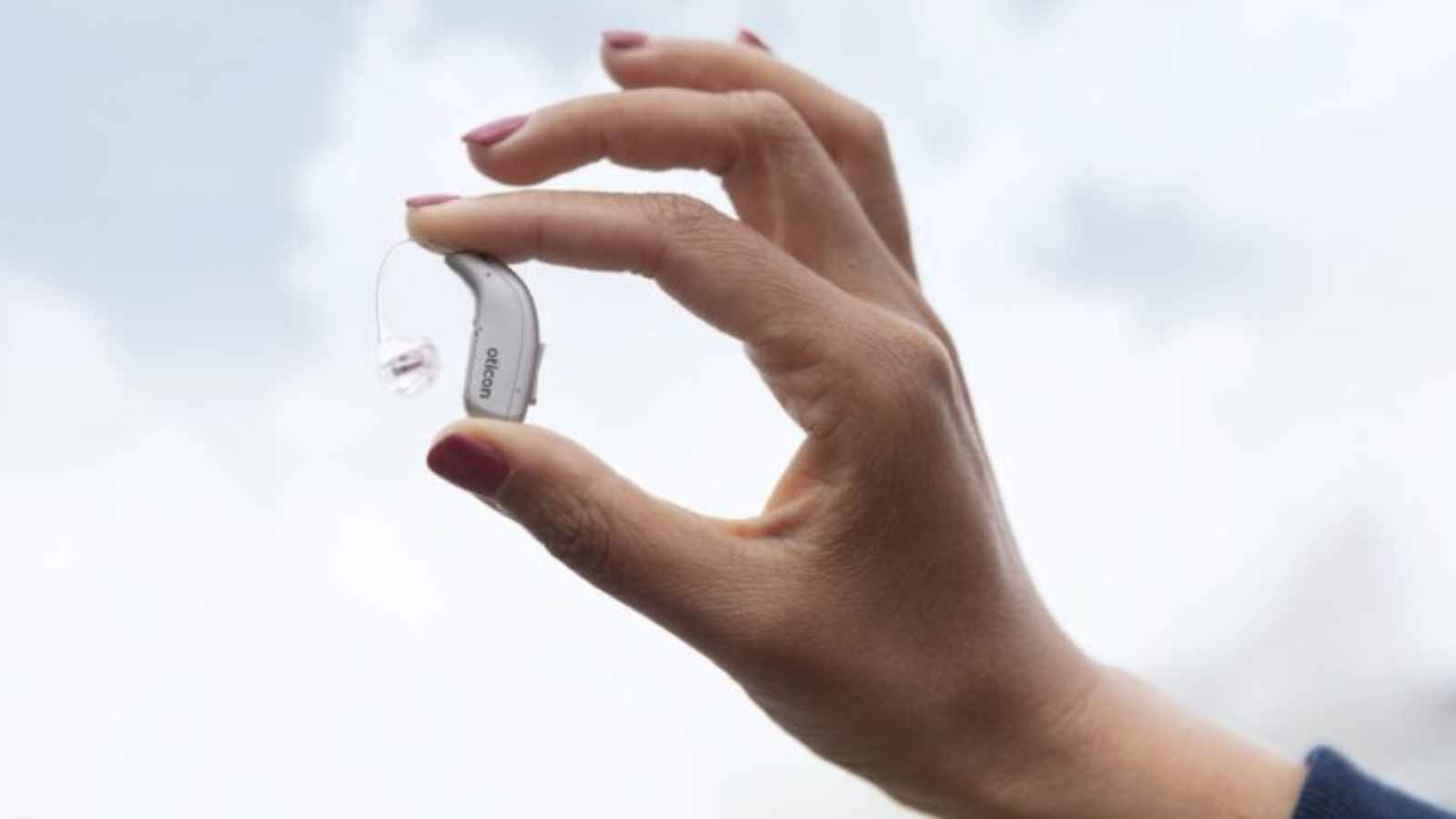
Regarding sound processing, hearing aids amplify speech sounds and other environmental sounds.
How hearing aids work:
- The sounds are picked up by the hearing aid microphones, which send electronic signals to the processor.
- The processor appropriately enhances the signals for hearing loss and sends them to the speakers, where they are delivered to the ear canal.
- The key to hearing aids’ effectiveness is the sound processing algorithms that are built into the device.
How Hearing Aids Process Speech
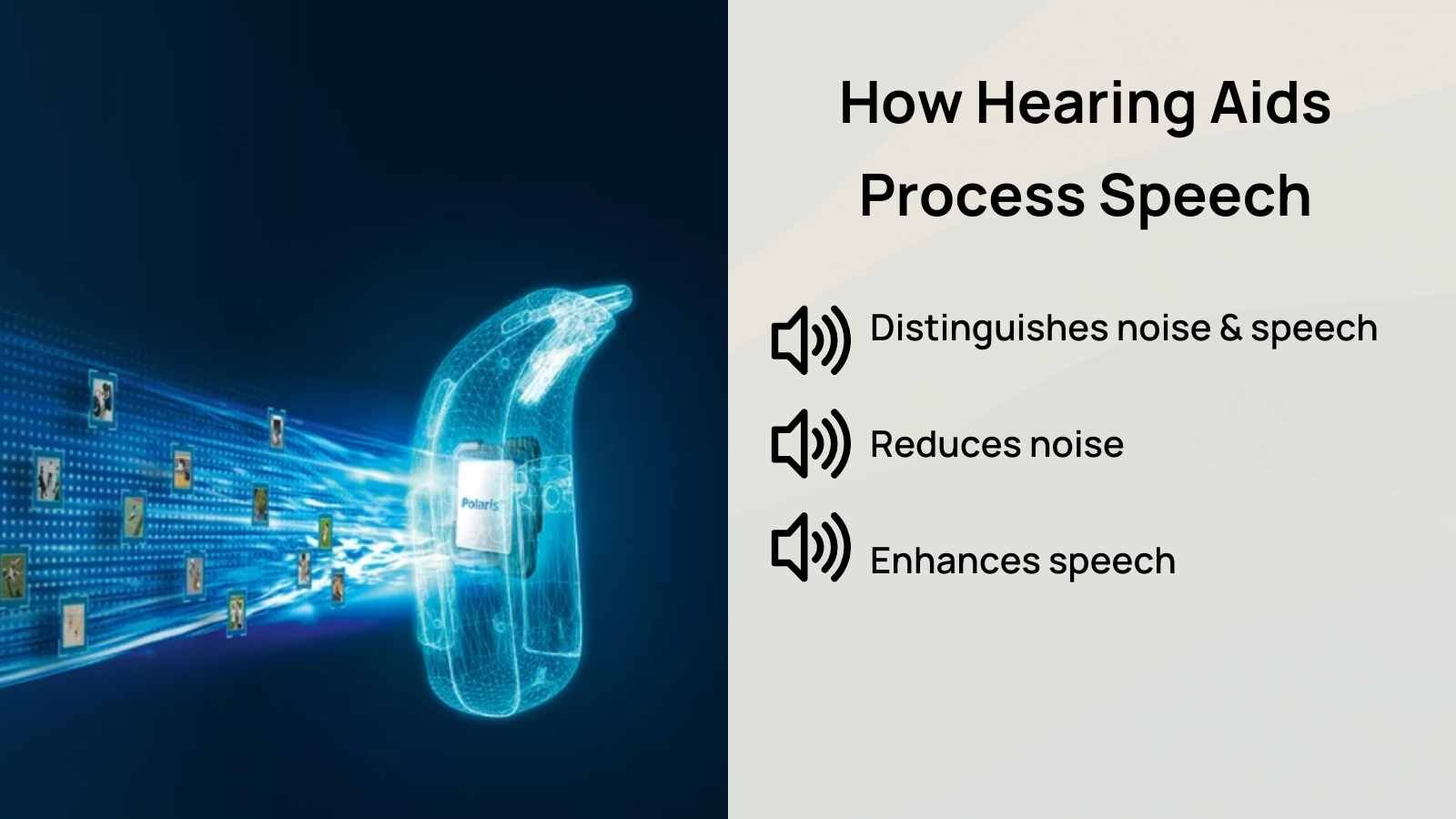
The primary purpose of a hearing aid is to improve speech audibility.
What the hearing aid does with the sounds it picks up depends on two factors:
- The type of sound
- The volume of the sound
More specifically, the hearing aid distinguishes noise and speech, reducing noise while enhancing speech.
The goal of the hearing aid is to amplify soft and normal conversational speech adequately while providing minimal amplification to loud speech. Based on your audiogram, the hearing aid applies frequency-specific volume to provide the volume that you need.
How Hearing Aids Process Music
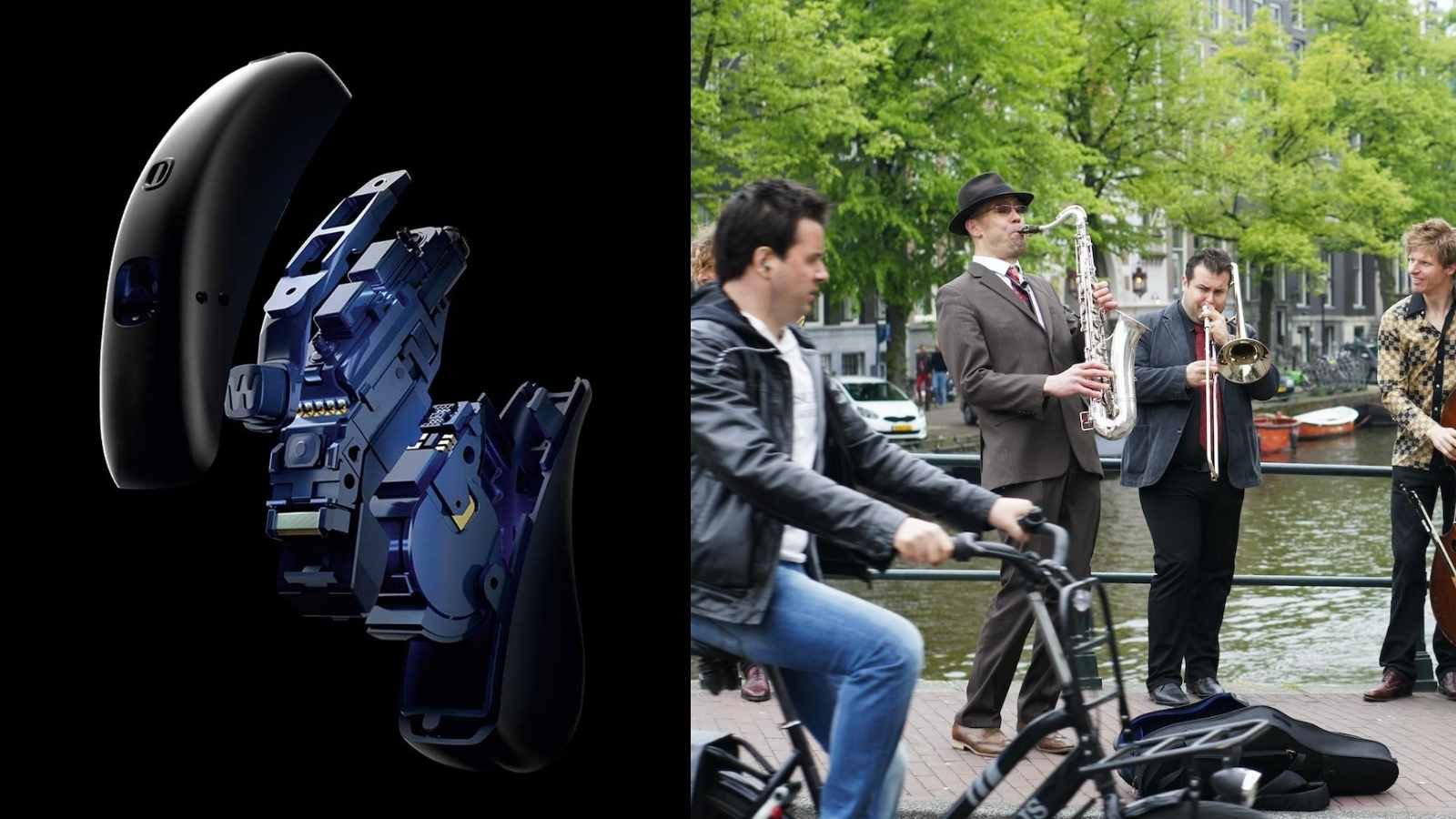
Essentially, music is approached the same as other sounds by hearing aid processing.
The hearing aid’s primary goal is to amplify speech; however, sound processing to optimize speech may conflict with optimal settings for music listening.
For example, the hearing aid behaves differently with soft than loud speech sounds (e.g., soft sounds are amplified more than loud sounds).
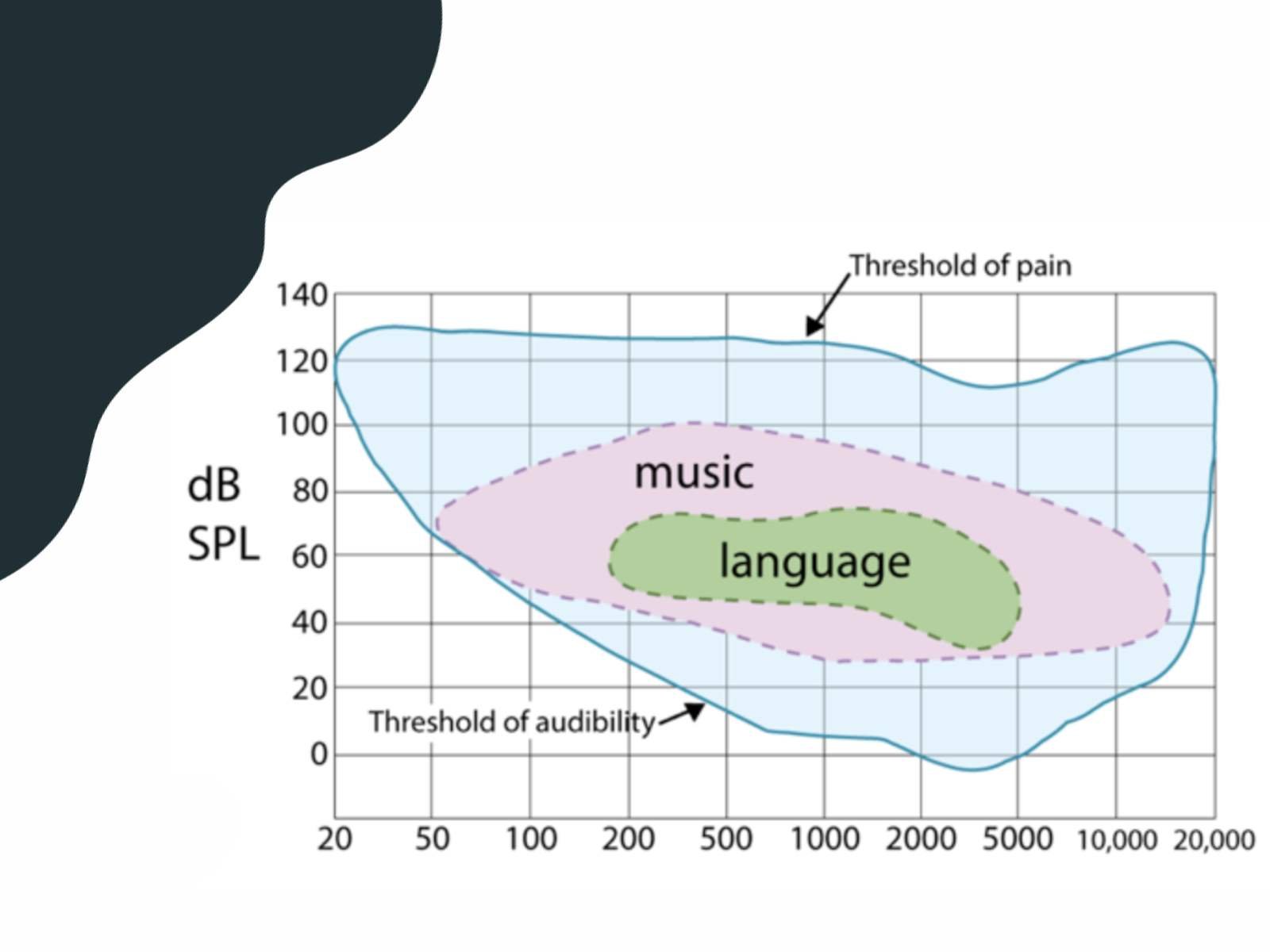
Music contains a wide range of volumes, a wider range of frequencies, variety of sounds and may or may not include speech or lyrics. Sounds that are typically “noise” in another setting might be a desired part of the music.
For example, the hearing aid often reduces a sudden, loud impulse noise (i.e., door slam), but that sudden volume change may be a desired part of the music you’re listening to.
Therefore, enjoying live music requires appropriate settings to preserve the fidelity of the sound. So what is an audiophile to do? Fortunately, there are plenty of options for music lovers and high fidelity sound enthusiasts.
Music Programs and Fine-Tuning
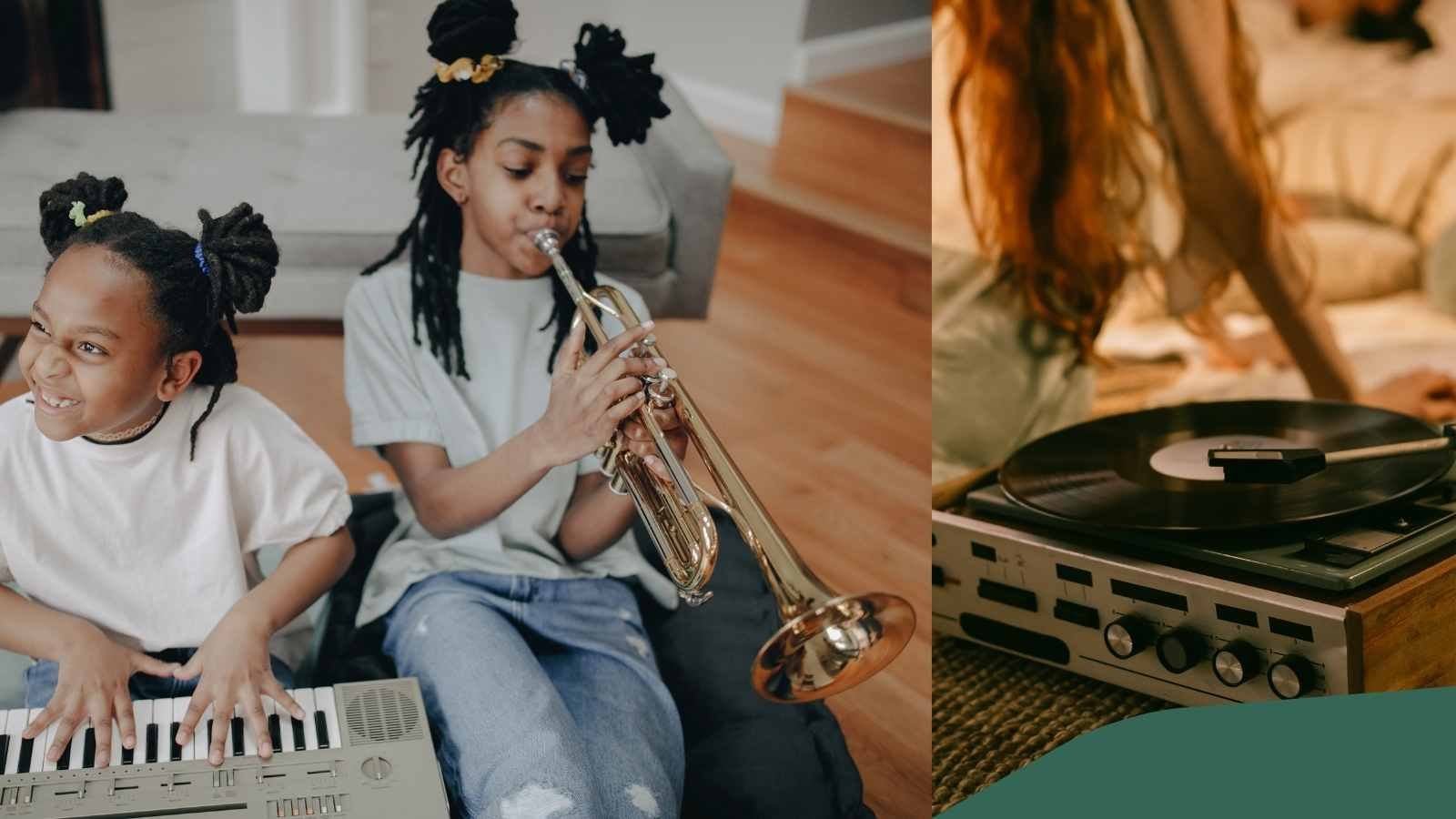
Music programs and fine-tuning can significantly improve the quality of music through hearing aids.
Are you a musician? Fine-tuning for your instrument can help improve sound quality.
Many hearing aids have music programs specifically designed to adjust the device to allow sound to come through with less distortion to the music’s sound quality.
For example, a music program disengages noise reduction programs, directional microphones, and frequency-lowering features. As music incorporates sounds that hearing aids may classify as “noise,” disengaging features, such as noise reduction, will help preserve the fidelity of the music.
To note, hearing aids are often programmed to enhance higher-frequency speech sounds. So that means depending on your instrument, the target frequency region may differ from the hearing aid’s default settings.
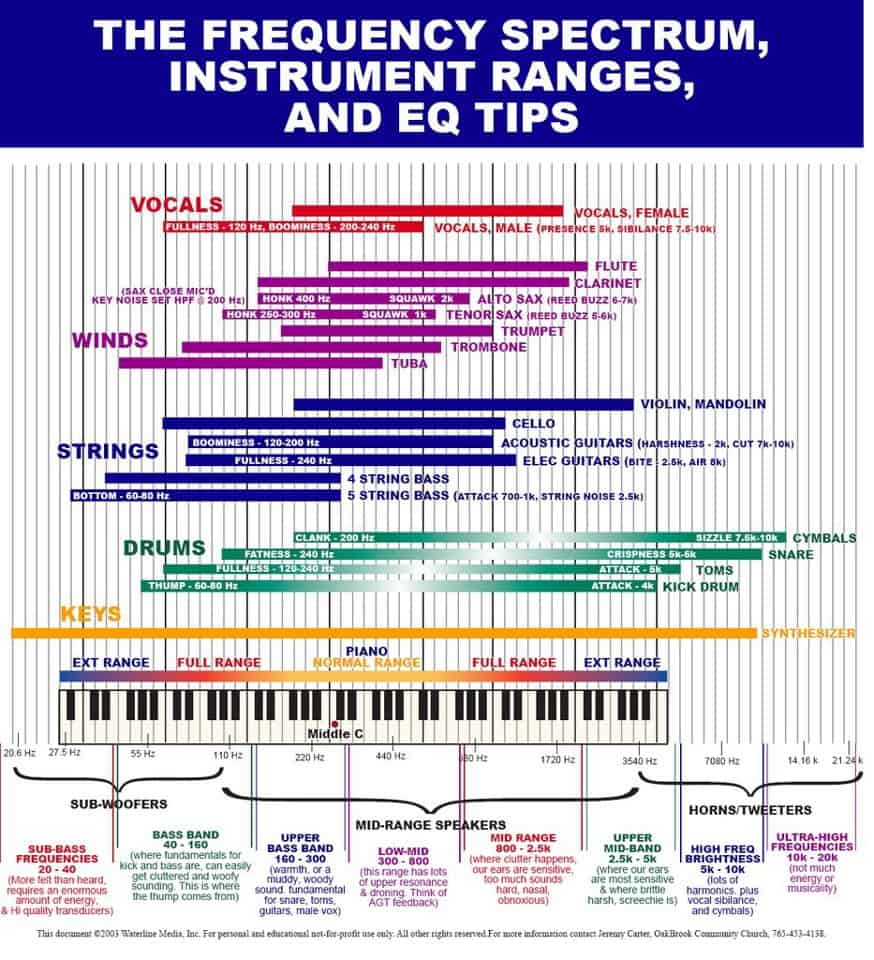
Final Thoughts
Hearing aids can significantly affect the quality of music and sound for people with hearing loss. The key is to choose a hearing aid that meets your needs and fine-tune the music program to your preferences.
It is also essential to communicate with your hearing healthcare professional about your music needs and preferences. If you’re looking for more resources, try our Live Listen feature to hear sound quality from different hearing aid options.

